
King and Queen County is a county in the U.S. state of Virginia, located in the state's Middle Peninsula on the eastern edge of the Richmond, VA, metropolitan area. As of the 2020 census, the population was 6,608. Its county seat is King and Queen Court House.

The College of Arms, or Heralds' College, is a royal corporation consisting of professional officers of arms, with jurisdiction over England, Wales, Northern Ireland and some Commonwealth realms. The heralds are appointed by the British Sovereign and are delegated authority to act on behalf of the Crown in all matters of heraldry, the granting of new coats of arms, genealogical research and the recording of pedigrees. The College is also the official body responsible for matters relating to the flying of flags on land, and it maintains the official registers of flags and other national symbols. Though a part of the Royal Household of the United Kingdom, the College is self-financed, unsupported by any public funds.
Shackleford Banks is a barrier island system on the coast of Carteret County, North Carolina. It contains a herd of feral horses, scallop, crabs and various sea animals, including summer nesting by loggerhead turtles. It is a tourist and beach camping site.
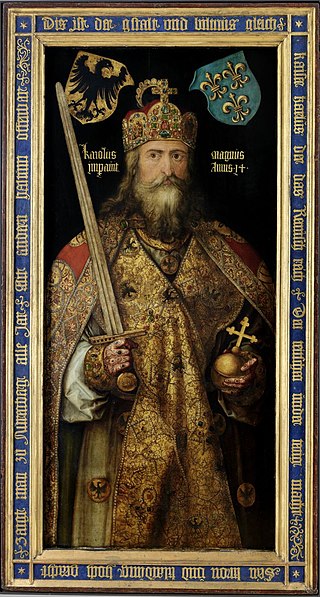
A royal descent is a genealogical line of descent from a past or present monarch.
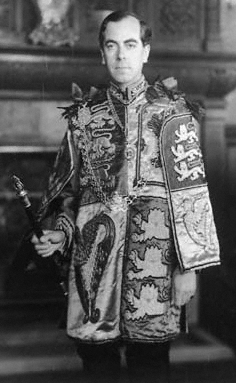
Sir Anthony Richard Wagner was a long-serving officer of arms at the College of Arms in London. He served as Garter Principal King of Arms before retiring to the post of Clarenceux King of Arms. He was one of the most prolific authors on the subjects of heraldry and genealogy of the 20th century.

Elsing Green Plantation, a National Historic Landmark and wildlife refuge, rests upon nearly 3,000 acres (1,200 ha) along the Pamunkey River in King William County, Virginia, a rural county on the western end of the state's middle peninsula, approximately 33 miles (53 km) northeast of the Richmond. The 18th-century plantation, now owned by the Lafferty family, has been in continuous operation for more than 300 years. In addition to the plantation house, dependency buildings and cultivated land, Elsing Green includes 2,454 acres (993 ha) of surrounding farmland, forest and marsh land. Elsing Green has been on the Virginia Landmarks Register and the National Register of Historic Places since 1969, and received formal National Historic Landmark status in 1971.
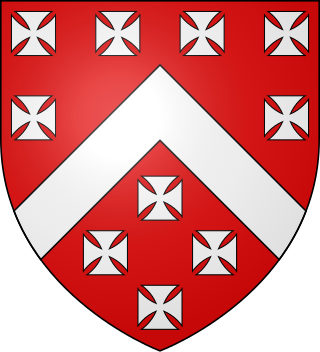
The Berkeley family is an ancient English noble family. It is one of only five families in Britain that can trace its patrilineal descent back to an Anglo-Saxon ancestor. The Berkeley family retains possession of much of the lands it held from the 11th and 12th centuries, centred on Berkeley Castle in Gloucestershire, which still belongs to the family.
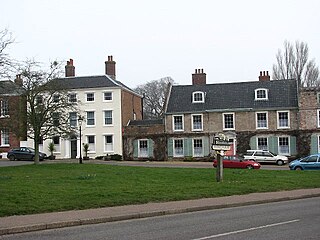
Hingham is a market town and civil parish in mid-Norfolk, England. The civil parish covers an area of 14.98 km2 (5.78 sq mi) and had a population of 2,078 in 944 households at the time of the 2001 census, increasing to 2,367 at the 2011 census.
John Writhe was a long-serving English officer of arms. He was probably the son of William Writhe, who represented the borough of Cricklade in the Parliament of 1450–51, and is most remembered for being the first Garter King of Arms to preside over the College of Arms. Writhe is also notable for the contention that it was he who developed the system of heraldic cadency employed by English officers of arms to the present day.
Withers – earlier Wither, Wyther – is an English surname of Old English origin. It is today a not uncommon family name found throughout the Anglosphere.

Ralph Bigland was an English officer of arms, antiquarian and cheesemaker. He was born at Stepney, Middlesex, and was the only son of Richard Bigland and his wife, Mary. His father was a native of Westmorland, descended from the Bigland family of Biglands. He should not be confused with his nephew Sir Ralph Bigland, who also served as an officer of arms.
Fettiplace is an English family name, allegedly of Norman descent, originating with a landed gentry family chiefly of Berkshire and Oxfordshire, from which came a baronetical line, extinct.
Richard Bennett was an English planter and Governor of the Colony of Virginia, serving 1652–1655. He had first come to the Virginia colony in 1629 to represent his merchant uncle Edward Bennett's business, managing his plantation known as Bennett's Welcome in Warrascoyack. Two decades later, Bennett immigrated to the Maryland colony with his family, and settled on the Severn River in Anne Arundel County.
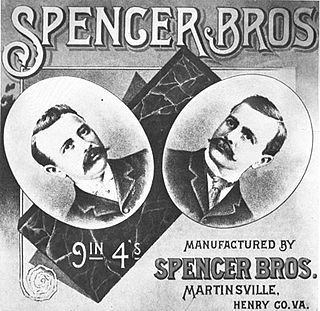
Spencer is an unincorporated community in Henry County, Virginia, United States. It takes its name from its earliest settler, James Spencer Sr., who moved from Loudoun County to Henry County with his sons in the eighteenth century. Spencer's son ensign James Spencer, Jr. died of wounds suffered during the Revolutionary War.
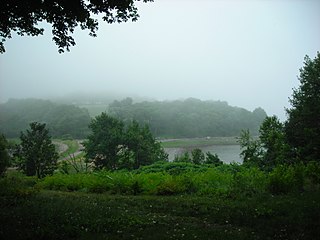
Moses Leavitt (1650–1730) was an early settler of Exeter, New Hampshire, in what is now the United States, where he worked as a surveyor. Later he became a large landowner, and served as selectman, and as a Deputy and later Moderator of the New Hampshire General Court from Exeter. He was the ancestor of several notable Leavitt descendants, including the well-known Meredith, New Hampshire, teacher and almanac maker Dudley Leavitt.

English heraldry is the form of coats of arms and other heraldic bearings and insignia used in England. It lies within the so-called Gallo-British tradition. Coats of arms in England are regulated and granted to individuals by the English kings of arms of the College of Arms. An individual's arms may also be borne 'by courtesy' by members of the holder's nuclear family, subject to a system of cadency marks, to differentiate those displays from the arms of the original holder. The English heraldic style is exemplified in the arms of British royalty, and is reflected in the civic arms of cities and towns, as well as the noble arms of individuals in England. Royal orders in England, such as the Order of the Garter, also maintain notable heraldic bearings.

Robert Cooke was an English Officer of Arms during the reign of Elizabeth I, who rose swiftly through the ranks of the College of Arms to Clarenceux King of Arms, serving in that office from 1567 until his death in 1592–3.

The American gentry were landowning members of the American upper class during the early modern period. Historians generally use the term "gentry" to refer to the planter class who resided in the Southern Colonies prior to the American Revolutionary War. They derived their income primarily from the ownership of plantations which produced cash crops using the forced labor of Black slaves and white indentured servants. North of the Province of Maryland, there were few large comparable rural estates, except in the Province of New York.
The name Terrell is a Norman surname, possibly meaning stubborn or follower of Thor, though, due to its Norman origin, either is possible. The first records of the family come with Walter Tirel III who is suspected of killing King William the II of England. The immigrant ancestor of the American branch was Richmond Terrell, who settled in New Kent County, Virginia from England in 1656. The most notable members of the family in the United States are descended either directly from him or his close relations.
George Reade was a prominent landowner, military officer, judge, and politician who served as a member of the House of Burgesses and as Acting Governor of Virginia Colony. He is the great-great-grandfather of the first President of the United States, George Washington.
















